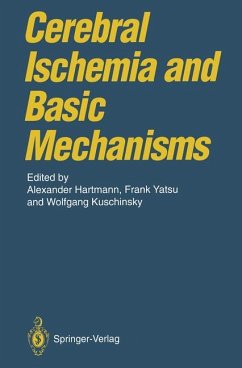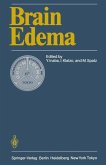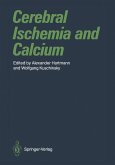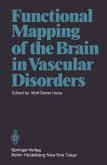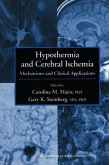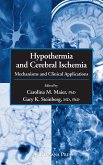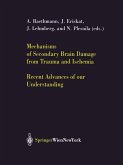Cerebral Ischemia and Basic Mechanisms
Herausgegeben von Hartmann, Alexander; Yatsu, Frank; Kuschinsky, Wolfgang
Cerebral Ischemia and Basic Mechanisms
Herausgegeben von Hartmann, Alexander; Yatsu, Frank; Kuschinsky, Wolfgang
- Broschiertes Buch
- Merkliste
- Auf die Merkliste
- Bewerten Bewerten
- Teilen
- Produkt teilen
- Produkterinnerung
- Produkterinnerung
In this volume, one of a series of monographs devoted to the problems of cerebral ischemia and related topics, we present the proceedings of an international conference on Cerebral Ischemia and Basic Mechanisms held in Bad Schachen/Lake Constance, Germany in June 1992. The enormous progress in research recently on the basic mechanisms associated with cerebral ischemia has provided greater insight into the pathophysiological mechanisms of reduced brain perfusion and decreased cerebral metabolism. The high technology instrumentation used to unravel the intricacies of cerebral blood flow and…mehr
Andere Kunden interessierten sich auch für
![Brain Edema Brain Edema]() Brain Edema77,99 €
Brain Edema77,99 €![Cerebral Ischemia and Calcium Cerebral Ischemia and Calcium]() Cerebral Ischemia and Calcium76,99 €
Cerebral Ischemia and Calcium76,99 €![Functional Mapping of the Brain in Vascular Disorders Functional Mapping of the Brain in Vascular Disorders]() Functional Mapping of the Brain in Vascular Disorders77,99 €
Functional Mapping of the Brain in Vascular Disorders77,99 €![Maturation Phenomenon in Cerebral Ischemia V Maturation Phenomenon in Cerebral Ischemia V]() Maturation Phenomenon in Cerebral Ischemia V75,99 €
Maturation Phenomenon in Cerebral Ischemia V75,99 €![Hypothermia and Cerebral Ischemia Hypothermia and Cerebral Ischemia]() Hypothermia and Cerebral Ischemia82,99 €
Hypothermia and Cerebral Ischemia82,99 €![Hypothermia and Cerebral Ischemia Hypothermia and Cerebral Ischemia]() CM Maier / GK Steinberg (eds.)Hypothermia and Cerebral Ischemia164,99 €
CM Maier / GK Steinberg (eds.)Hypothermia and Cerebral Ischemia164,99 €![Mechanisms of Secondary Brain Damage from Trauma and Ischemia Mechanisms of Secondary Brain Damage from Trauma and Ischemia]() Alexander Baethmann / Jörg Eriskat / Jens Lehmberg / Nikolaus Plesnila (eds.)Mechanisms of Secondary Brain Damage from Trauma and Ischemia115,99 €
Alexander Baethmann / Jörg Eriskat / Jens Lehmberg / Nikolaus Plesnila (eds.)Mechanisms of Secondary Brain Damage from Trauma and Ischemia115,99 €-
-
-
In this volume, one of a series of monographs devoted to the problems of cerebral ischemia and related topics, we present the proceedings of an international conference on Cerebral Ischemia and Basic Mechanisms held in Bad Schachen/Lake Constance, Germany in June 1992. The enormous progress in research recently on the basic mechanisms associated with cerebral ischemia has provided greater insight into the pathophysiological mechanisms of reduced brain perfusion and decreased cerebral metabolism. The high technology instrumentation used to unravel the intricacies of cerebral blood flow and metabolism includes positron emission tomography and magnetic resonance imaging. A description of sophisticated neurophysiological techniques will give the reader insight into new models of reversible and irreversible tissue damage and changes at the molecular level have been described. The therapeutic approaches which have developed from this re search have been or will be used in clinical trials and will open new avenues in the treatment of stroke. The organizers of the meeting would like to thank the advisory board for its helpful suggestions and the Deutsche Forschungsgemeinschaft and other sponsors for their important support.
Produktdetails
- Produktdetails
- Verlag: Springer / Springer Berlin Heidelberg / Springer, Berlin
- Artikelnr. des Verlages: 978-3-642-78153-7
- Softcover reprint of the original 1st ed. 1994
- Seitenzahl: 464
- Erscheinungstermin: 16. Dezember 2011
- Englisch
- Abmessung: 235mm x 155mm x 25mm
- Gewicht: 698g
- ISBN-13: 9783642781537
- ISBN-10: 3642781535
- Artikelnr.: 36114366
- Herstellerkennzeichnung Die Herstellerinformationen sind derzeit nicht verfügbar.
- Verlag: Springer / Springer Berlin Heidelberg / Springer, Berlin
- Artikelnr. des Verlages: 978-3-642-78153-7
- Softcover reprint of the original 1st ed. 1994
- Seitenzahl: 464
- Erscheinungstermin: 16. Dezember 2011
- Englisch
- Abmessung: 235mm x 155mm x 25mm
- Gewicht: 698g
- ISBN-13: 9783642781537
- ISBN-10: 3642781535
- Artikelnr.: 36114366
- Herstellerkennzeichnung Die Herstellerinformationen sind derzeit nicht verfügbar.
Alexander Hartmann, geboren 1985, ist einer der erfolgreichsten Mentalisten Europas und Deutschlands jüngster Top100 Keynote-Speaker. Seinen großen Durchbruch schaffte er in der Pro7 Sendung "The next Uri Geller". Inzwischen hat er seine eigene TV-Show, hält regelmäßig Vorträge und Seminare, hat ein eigenes Hypnosezentrum gegründet und sich als Experte für das Thema Unterbewusstsein etabliert. Der deutsch-englische Muttersprachler ist mit seinen Seminaren und Vorträgen auch international sehr gefragt. Er lebt und arbeitet in Stuttgart.
The Window of Opportunity for the Treatment of Cerebral Ischemia.- The Window of Opportunity for the Treatment of Cerebral Ischemia.- Energy Metabolism.- Uncoupling of Flow and Metabolism in Early Ischemic Stroke.- Recovery from Motor Stroke: Different Patterns of Functional Reorganisation in Individual Patients.- Head Injuries: A Target for Neuroprotection.- Changes in the Biophysical Environment of Water Following Focal Brain Ischemia in the Rat.- Acidosis.- Aspects of Acid-Base Homeostasis in Ischemia.- Acidosis: A Marker for Penumbra or a Target for Treatment?.- Astrocytic H+ and Ca2+ Changes: Implications for Ischemic Brain Injury.- Anoxic Injury of Central Myelinated Axons: Nonsynaptic Ionic Mechanisms.- In Vivo Nuclear Magnetic Resonance Observation of Cerebral Metabolism.- Effects of Extracellular Acidosis on Glial Cell Intracellular pH: Evidence for a Glial Spatial H+ - Buffering Mechanism?.- Intracellular Messengers.- Calcium Channel Blockers Prevent Delayed Cerebral Ischemia After Intracranial Aneurysmal Subarachnoid Hemorrhage.- Monosialoganglioside GM1 in Experimental Models of Stroke.- What Are We Learning from Clinical Trials in Acute Cerebral Ischemia?.- Threshold of Calcium Influx After Global and Focal Ischemia: Implications for the Window of Therapeutic Opportunity.- Non-NMDA Glutamate Receptors in the Regulation of Neuronal Ca2+ and Excitotoxicity.- Phenylalkylamine Calcium Antagonists as Cerebroprotective Agents.- Intracellular Messengers After Ischemia.- Influence of NMD A Receptor Antagonists on Glycine Receptor Isoform Expression in Spinal Cord Cultures.- Effects of Calcium Antagonists on Experimentally Induced Carotid Intimal Proliferations.- Excitatory Amino Aids and Excitotoxicity.- Unsettled Role of Glutamate/Glutamate Receptors in Ischemic Excitotoxic Neuronal Damage.- Neuroprotective Effects of 5-HT1A Receptor Agonists.- In Vitro Ischemia in the Hippocampal Slice.- Glial Swelling and Damage by Arachidonic Acid.- Free Radicals, Protein Synthesis.- Disturbances of Cerebral Protein Synthesis in Global and Focal Ischemia.- Neurotrophin Expression and Gene Regulation in a Focal Cerebral Ischemia Model in the Rat.- Nitroarginine Reduces Infarction After Middle Cerebral Artery Occlusion in Rats.- No Appreciable Swelling of Cultured Neurons After Oxygen Deprivation, and Cell Damage Occasionally Aggravated by Oxygen Resupply.- Gene Expression.- Changes in Gene Expression After Brief Ischemic Insults as Potential Mediators of Induced Tolerance: Postischemic Temperature as a Variable Affecting the Stress Response.- Heat Shock Gene Expression as a Marker of Ischemic and Other Types of Injury.- Gene Expression and Functional Changes After Acute Ischemia: Age-Related Differences in Outcome and Mechanisms.- Models of Neural Circuit Reorganization After Injury.- Clinical Relevance of Gene Expression in Cerebral Ischemia.- Leukocytes, Microcirculation, and the Coagulation System.- Mechanisms of Leukocyte-Mediated No-Reflow and Tissue Injury in the Microcirculation.- Microcirculatory Changes in Cerebral Ischemia.- Current Evidence on a Pathophysiological Function of Leukocyte /Endothelial Interactions in Cerebral Ischemia.- Do Leukocytes Contribute to the Brain Lesion That Begins When an Intracranial Artery Is Occluded?.- Contribution of Neutrophils to Ischemic Brain Damage.- Polymorphonuclear Leukocyte Adherence and Microvascular Reflow After Focal Cerebral Ischemia/Reperfusion.- Activation of the Coagulation System and Concomitant Impairment of White Cell Rheology in Patients with Acute Cerebral Infarction.- Microcirculatory Disturbance and Leukocytes: Influence of Leukocyte-Produced Superoxide on Red Blood Cell Aggregation.- Small Volume Resuscitation in Hemorrhagic Shock by Hycellupertonic/Hyperoncontic Saline-Dextran: Effects on the Central Nervous System.- Effects of Pentoxifylline on Recovery from Cerebral Ischemia and Reperfusion Injury.- Regional Cerebral Blood Flow in Acute Stroke: Comparison of Two Calcium Antagonists.
The Window of Opportunity for the Treatment of Cerebral Ischemia.- The Window of Opportunity for the Treatment of Cerebral Ischemia.- Energy Metabolism.- Uncoupling of Flow and Metabolism in Early Ischemic Stroke.- Recovery from Motor Stroke: Different Patterns of Functional Reorganisation in Individual Patients.- Head Injuries: A Target for Neuroprotection.- Changes in the Biophysical Environment of Water Following Focal Brain Ischemia in the Rat.- Acidosis.- Aspects of Acid-Base Homeostasis in Ischemia.- Acidosis: A Marker for Penumbra or a Target for Treatment?.- Astrocytic H+ and Ca2+ Changes: Implications for Ischemic Brain Injury.- Anoxic Injury of Central Myelinated Axons: Nonsynaptic Ionic Mechanisms.- In Vivo Nuclear Magnetic Resonance Observation of Cerebral Metabolism.- Effects of Extracellular Acidosis on Glial Cell Intracellular pH: Evidence for a Glial Spatial H+ - Buffering Mechanism?.- Intracellular Messengers.- Calcium Channel Blockers Prevent Delayed Cerebral Ischemia After Intracranial Aneurysmal Subarachnoid Hemorrhage.- Monosialoganglioside GM1 in Experimental Models of Stroke.- What Are We Learning from Clinical Trials in Acute Cerebral Ischemia?.- Threshold of Calcium Influx After Global and Focal Ischemia: Implications for the Window of Therapeutic Opportunity.- Non-NMDA Glutamate Receptors in the Regulation of Neuronal Ca2+ and Excitotoxicity.- Phenylalkylamine Calcium Antagonists as Cerebroprotective Agents.- Intracellular Messengers After Ischemia.- Influence of NMD A Receptor Antagonists on Glycine Receptor Isoform Expression in Spinal Cord Cultures.- Effects of Calcium Antagonists on Experimentally Induced Carotid Intimal Proliferations.- Excitatory Amino Aids and Excitotoxicity.- Unsettled Role of Glutamate/Glutamate Receptors in Ischemic Excitotoxic Neuronal Damage.- Neuroprotective Effects of 5-HT1A Receptor Agonists.- In Vitro Ischemia in the Hippocampal Slice.- Glial Swelling and Damage by Arachidonic Acid.- Free Radicals, Protein Synthesis.- Disturbances of Cerebral Protein Synthesis in Global and Focal Ischemia.- Neurotrophin Expression and Gene Regulation in a Focal Cerebral Ischemia Model in the Rat.- Nitroarginine Reduces Infarction After Middle Cerebral Artery Occlusion in Rats.- No Appreciable Swelling of Cultured Neurons After Oxygen Deprivation, and Cell Damage Occasionally Aggravated by Oxygen Resupply.- Gene Expression.- Changes in Gene Expression After Brief Ischemic Insults as Potential Mediators of Induced Tolerance: Postischemic Temperature as a Variable Affecting the Stress Response.- Heat Shock Gene Expression as a Marker of Ischemic and Other Types of Injury.- Gene Expression and Functional Changes After Acute Ischemia: Age-Related Differences in Outcome and Mechanisms.- Models of Neural Circuit Reorganization After Injury.- Clinical Relevance of Gene Expression in Cerebral Ischemia.- Leukocytes, Microcirculation, and the Coagulation System.- Mechanisms of Leukocyte-Mediated No-Reflow and Tissue Injury in the Microcirculation.- Microcirculatory Changes in Cerebral Ischemia.- Current Evidence on a Pathophysiological Function of Leukocyte /Endothelial Interactions in Cerebral Ischemia.- Do Leukocytes Contribute to the Brain Lesion That Begins When an Intracranial Artery Is Occluded?.- Contribution of Neutrophils to Ischemic Brain Damage.- Polymorphonuclear Leukocyte Adherence and Microvascular Reflow After Focal Cerebral Ischemia/Reperfusion.- Activation of the Coagulation System and Concomitant Impairment of White Cell Rheology in Patients with Acute Cerebral Infarction.- Microcirculatory Disturbance and Leukocytes: Influence of Leukocyte-Produced Superoxide on Red Blood Cell Aggregation.- Small Volume Resuscitation in Hemorrhagic Shock by Hycellupertonic/Hyperoncontic Saline-Dextran: Effects on the Central Nervous System.- Effects of Pentoxifylline on Recovery from Cerebral Ischemia and Reperfusion Injury.- Regional Cerebral Blood Flow in Acute Stroke: Comparison of Two Calcium Antagonists.

